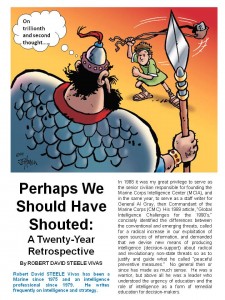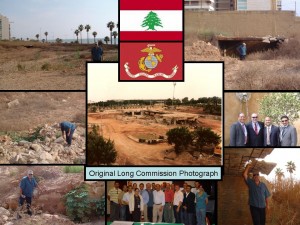 What Humans Knew in 1990's That Secret Mandarins Refused to Hear, June 28, 2008
What Humans Knew in 1990's That Secret Mandarins Refused to Hear, June 28, 2008
Ralph Peters
This book is not, as some might expect, a collection of past Op-Eds, but rather an extraordinary retrospective at the 1989-1996 time frame when officers like Ralph (and General Al Gray, myself, and a number of others in the Army and the Marines) were seeing the writing on the wall: the end of big war and the emergence of global instability in every clime and place). Ralph actually walked the ground and had “eyes on.”
I was immediately charmed anew by the poetic writing and the visually elegant turns of phrase. I have in my notes: chuckled, amused, reminded.
This review is going to combine my fly leaf notes with as many short quotes as I can fit in within my 1,000 word allotment.
Notes first:
Deep reading of Tolstoy and others set the stage for *understanding* today's culture and mindset in Russia. Earlier in his life, a subscription gift from an aunt to National Geographic opened his eyes to the rest of the world.
Early on, disdain for how we spend billions on satellites and nothing on officers walking the ground. He notes that overt human intelligence can absorb and articulate what no satellite can provide: “the temper of the people, the taste of the land.”
USSR in 1991 was potholes and rust. In his “walk-about” he gained direct invited access to an MVD commander's office, to all of the local “secret” messages, and had invited “eyes on” the MVD special intelligence communications room.
In the Bosnia-Kosovo run-up, which he and others anticipated, he learned that Europe cannot be trusted to act in unison or decisively in the absence of strong US leadership–France, Germany, and the United Kingdom all revert to their historical animosities, and despite their large standing armies, lack the political will or the deep strategic analytics necessary to use those armies in a coherent manner.
His respect for Armenia is deeply rooted in his on the ground experience among them.
Col Stu Herrington, whose book Traitors Among Us: Inside the Spy Catcher's World I have praised, is strongly praised in this book. He and the author were part of a team that worked with the Russians to address the long-standing concern over Americans being held in the Gulag, and the pages in this book, covering each of the wars from World War II onwards, are a complete surprise and essential reading for anyone interested in POW/MIA accounting.
He blasts the US policy of crop eradication, and his devastating criticism of arm-chair politicians and ivory tower diplomats warms my heart.
Late in the book he focused on Pakistan and I find this chapter especially vital for the public understanding of how the US is destroying its once-close ties to the Pakistani officer corps. The older officers are fully trained by the British or the US. The company and field grade officers are not, and are so delusional about Islam and so ignorant about the rest of the world as to be very dangerous to us.
Throughout the book he laments the lot of women across most Islamic countries (with Indonesia and Malaysia as notable exceptions; I add this from my own knowledge and Ralph's official report to the Marine Corps in the 1990's).
Now the quotes. Page number, then words:
8 On [the Russian and Central Asian] frontiers, humanity is a brotherhood of smugglers.
29 Only its women allowed the Soviet Union to endure as long as it did.
38 …I am convinced there is no Russian word for maintenance.
45 …worry too much about dead facts and too little about their antagonist's delusions.
66 Artist and intelligence challenges similar: an eye for detail and ability to reduce complexity to coherence
73 …no one in the US intelligence community was interested. If the data didn't come from a satellite, it didn't count.
87 What Belgrade lacked … was human dignity.
108 I knew we could overpower [Iraqi] military….I had seen…his officer corps…drunk and whoring.
132 Conquest of Central Asia is a chronicle of…cruelty….Soviets are the champs….[others] tortured human beings. The Soviet Union tortured the earth itself.
141 Bukhara is where Islam turned dark…
146 The Clinton Administration was run by intolerant dreamers… With neither self-critical faculties nor experience of the world …
151 Islam froze by the mid-fifteenth century when science-fearing zealots….
172 And there you have our diplomats. Unwilling to talk to our enemies… Unwilling to learn.
200 Azerbaijan was the first place where I got n inside look at the nastiness of our Saudi “friends.”
204 Everywhere, the Saudis took an interest in human suffering only if it offered them an entry point for missionary activities. And any Muslim who wouldn't sign up for … Wahhabi Puritanism was welcome to die.
218 …the callousness with which our government had treated the family members of our MIAs…
231 [General McCaffrey] wasn't getting an adequate tie-it-all-together picture of the cocaine problem. Not from his staff, and not from the alphabet-soup agencies…
239 You cannot take away the livelihood of the poor [coca crops] unless you have the wherewithal to replace it immediately and enduringly.
244 Found wealth, when immature countries…hit the natural-resources lottery, is uniformly destructive of the souls of men and nations.
251 [Army saw the future coming.] It was impossible, however, to persuade the Clinton White House, the intelligence establishment, or even our own services (except for the Marines) that our enemies, rather than our desires, would shape the future security environment.
319 [Drug Czar] was not allowed to differentiate between hard and soft drugs.
335 [At the Plain of Jars] I saw my country's dark side….we go mad now and then. And when we do, we leave desolation behind.
This is an amazing book and for anyone who is concerned with strategic warning, honest intelligence, strategy, force structure, the need to rebalance the instruments of national power, and the future of humanity, will find this book inspiring.
E Veritate Potens–From Truth, We the People Are Empowered
See also:
Wars of Blood and Faith: The Conflicts That Will Shape the 21st Century
Robert Young Pelton's The World's Most Dangerous Places: 5th Edition (Robert Young Pelton the World's Most Dangerous Places)
The Coming Anarchy: Shattering the Dreams of the Post Cold War
The Warning Solution : Intelligent Analysis in the Age of Information Overload
None So Blind: A Personal Account of the Intelligence Failure in Vietnam
On Intelligence: Spies and Secrecy in an Open World
The New Craft of Intelligence: Personal, Public, & Political–Citizen's Action Handbook for Fighting Terrorism, Genocide, Disease, Toxic Bombs, & Corruption
Information Operations: All Information, All Languages, All the Time
THE SMART NATION ACT: Public Intelligence in the Public Interest









